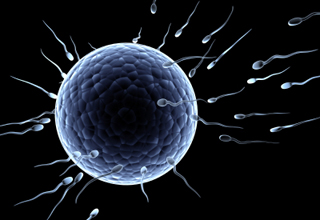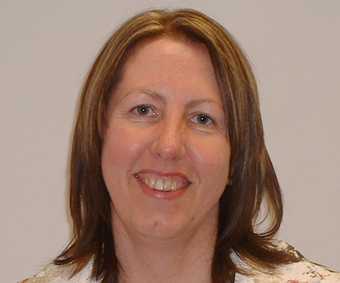Female Fertility
Interview with Professor Geraldine Hartshorne, Warwick Medical School
Published October 2010
“Human beings are not as fertile as many other animals,” explains Professor Geraldine Hartshorne. Considering the list of things that can go wrong from ovulation to the birth of a child, it seems miraculous that any of us make it. Some couples have incompatible gametes, fertilised embryos can suffer developmental abnormalities and arrest, implanted embryos may not develop, and that is all before the trials of the first trimester. Perhaps a third of the eggs produced are abnormal, a tenth fail to fertilise (even when sperm are apparently normal) and then around half of fertilised embryos do not fully develop.
 Despite these potential complications, however, the vast majority of people will conceive within one year of trying. The NICE guidelines on fertility state “…about 84% of couples in the general population will conceive within one year if they do not use contraception and have regular sexual intercourse. Of those who do not conceive in the first year, about half will do so in the second year (therefore the cumulative pregnancy rate is 92%). ”For those that have difficulty getting pregnant, infertility investigations and some treatments are readily available on the NHS. But for people who need IVF treatment, NHS funding is much more variable and depends upon where they live as well as health and social criteria applied by their local healthcare commissioners,” said Prof Hartshorne.
Despite these potential complications, however, the vast majority of people will conceive within one year of trying. The NICE guidelines on fertility state “…about 84% of couples in the general population will conceive within one year if they do not use contraception and have regular sexual intercourse. Of those who do not conceive in the first year, about half will do so in the second year (therefore the cumulative pregnancy rate is 92%). ”For those that have difficulty getting pregnant, infertility investigations and some treatments are readily available on the NHS. But for people who need IVF treatment, NHS funding is much more variable and depends upon where they live as well as health and social criteria applied by their local healthcare commissioners,” said Prof Hartshorne.
Women are born with all the eggs they will ever produce... by the menopause there are only about 1000 left.
The biggest factor affecting a woman’s fertility is age. The NICE guidelines continue: “...female fertility declines with age, but the effect of age on male fertility is less clear. With regular unprotected sexual intercourse, 94% of fertile women aged 35 years, and 77% of those aged 38 years, will conceive after 3 years of trying.” A major cause of this decline is the reducing number of egg follicles in the ovaries: “Women are born with all the eggs they will ever produce. They start with about 700,000 at birth, at menarche there are around 200,000, but by the menopause there are only about 1000 left.” Each month many follicles start growing in preparation for ovulation but most do not make it very far: “The eggs perish by apoptosis, literally meaning ‘programmed cell death’. It is part of the natural selection process; the eggs are competing with each other.”
For women who struggle to become pregnant, medical intervention cannot always provide a solution. In many cases, the cause of the problem is not clear, and even after diagnostic tests and treatments aimed at increasing fertility, including stimulatory medicines and IVF, sometimes no reason becomes evident. The success rates of IVF are currently around 30% per attempt, and steadily rising year on year. However, the rate of increase is very slow and there is much that we do not know about fertility and embryo development.
There are many people now undergoing cancer treatment and surviving... Their future quality of life may be affected by their ability to have children.
Prof Hartshorne spends half of her time conducting research into the scientific understanding of fertility and the rest engaging with the clinical side, directing the Centre for Reproductive Medicine at University Hospital Coventry and Warwickshire NHS Trust. At the moment she is particularly concerned that many men are not making the most of the opportunity to bank sperm before undergoing cancer treatment that might affect their fertility; some chemotherapy drugs can cause a man’s sperm count to be permanently reduced or even disappear altogether, but not everyone is aware that this is the case, and in the distressing circumstances of a cancer diagnosis the possibility of storing sperm before treatment might be overlooked.
It is hoped that raising the profile of this issue will allow more men to make the most of the options available. “There are many people now undergoing cancer treatment and surviving, who would not have done so ten years ago. Their future quality of life may be affected by their ability to have children and banking sperm is a relatively easy way of protecting this possibility. This is a clinical practice issue; the NHS usually supports this service for cancer patients who meet their criteria, but our research found that only some men were being asked about whether they would like to do so.”
Unfortunately some similar issues affect women facing cancer treatment; their fertility may also decrease in response to some cancer treatments, but in contrast to the situation for men, the process of producing and banking eggs can take several weeks and only a few eggs can be produced at any one time. “For women, hormone treatment followed by a minor surgical procedure is needed, and this normally results in only perhaps 10 eggs.” Prof Hartshorne is currently working on a research project to gain a better understanding of the effects of cancer treatment on the egg reserves of young women suffering from breast cancer or lymphoma. The aim is to provide more detailed information to women in advance about the potential effects of a specific treatment on their fertility.
 Geraldine Hartshorne joined the University in 1995, working first in the Department of Biological Sciences, and moving to Warwick Medical School in 2006. She was among the first appointments heralding the Medical School and holds a joint position as Scientific Director of the Centre for Reproductive Medicine at University Hospital Coventry and Warwickshire NHS Trust. Specialising in reproductive medicine, her research aims to improve understanding of the scientific basis of fertility and infertility, with particular emphasis on oocyte and embryo development and function. Her expertise spans research and clinical applications. She has taken a lead nationally in the continued professional development of Clinical Embryologists and is Chair of the Panel of Examiners at the Royal College of Pathologists. She holds several professional advisory roles, advising EU, Human Fertilisation and Embryology Authority, the Health Professions Council and the Department of Health.
Geraldine Hartshorne joined the University in 1995, working first in the Department of Biological Sciences, and moving to Warwick Medical School in 2006. She was among the first appointments heralding the Medical School and holds a joint position as Scientific Director of the Centre for Reproductive Medicine at University Hospital Coventry and Warwickshire NHS Trust. Specialising in reproductive medicine, her research aims to improve understanding of the scientific basis of fertility and infertility, with particular emphasis on oocyte and embryo development and function. Her expertise spans research and clinical applications. She has taken a lead nationally in the continued professional development of Clinical Embryologists and is Chair of the Panel of Examiners at the Royal College of Pathologists. She holds several professional advisory roles, advising EU, Human Fertilisation and Embryology Authority, the Health Professions Council and the Department of Health.